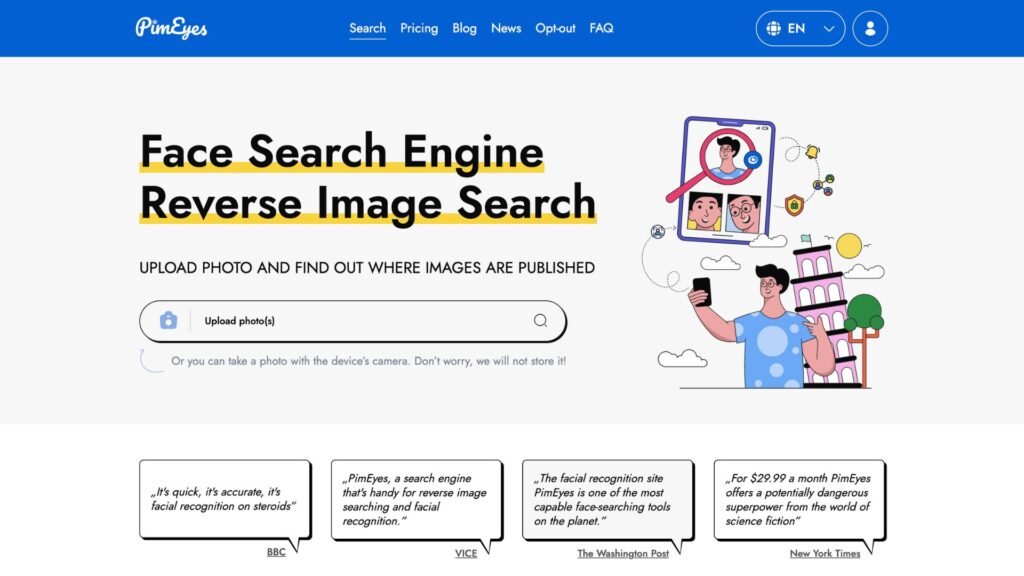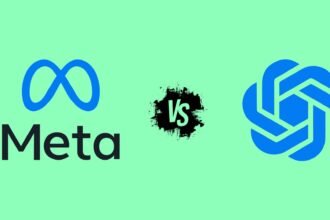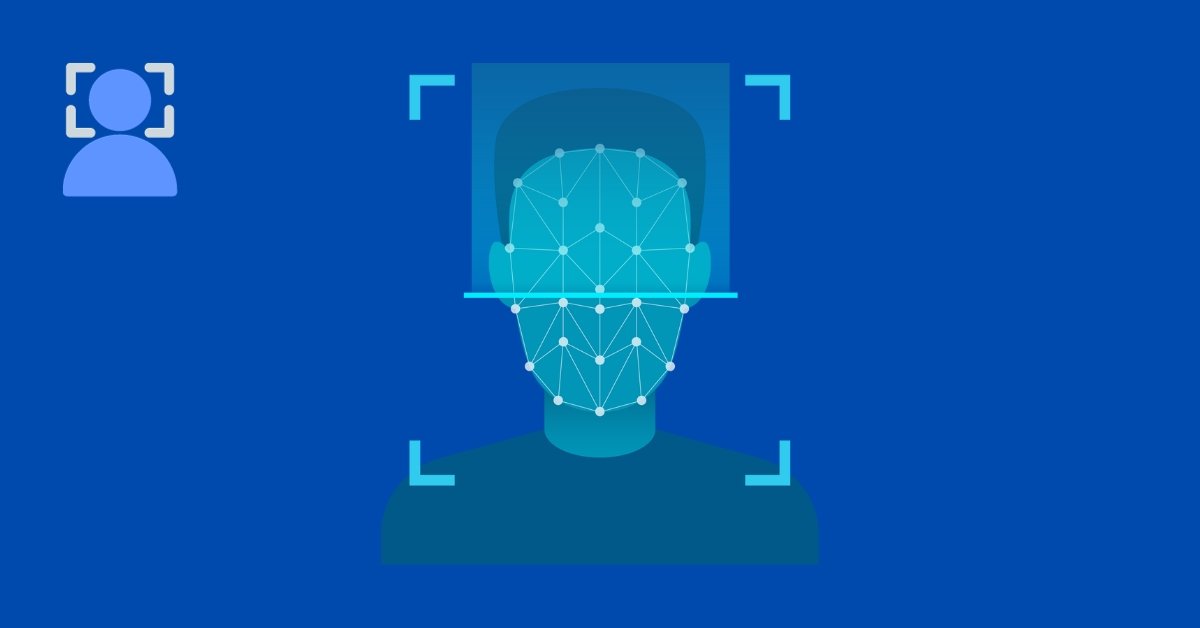PimEyes made waves as a powerful facial recognition service for tracking down images based on individuals’ faces.
However, privacy concerns and usage constraints have opened doors for alternatives offering advanced capabilities. This guide covers the top PimEyes competitors to consider.
PimEyes has captured attention recently as a powerful online facial recognition search engine. But how exactly does it work, what can it do, and is it safe? This guide takes a deep look at using PimEyes effectively while protecting your privacy.
What is PimEyes Search Engine
PimEyes powered by artificial intelligence and computer vision, PimEyes delivers stunningly accurate facial matches from billions of images across the web. Just a photo upload leads to discovering its presence across social media, news articles, galleries and more.
However, limitations around search volume, result filters and ethical queries have sparked demand for alternatives catering to different user needs.
Privacy-centric tools are emerging that also trump PimEyes with enhanced accuracy, flexible pricing, and bigger image databases. Major players like Google and Yandex also offer compelling free alternatives.

Let’s explore the top six PimEyes competitors providing next-gen facial recognition capabilities.
Top 6 Alternatives to PimEyes
Here are the best 6 PimEyes alternatives, you can try anything you like.
1. Yandex Images
As Russia’s leading technology company, Yandex offers advanced computer vision solutions for various verticals. Their image search utilizes deep learning algorithms to find visual matches across objects, landmarks and faces.
Key Features:
- Freely conduct unlimited searches without registration
- Support automatic and manual face attribute tagging
- Filters like usage rights and image type
- Image upload for reverse search
With over 20 billion images indexed and continuous AI optimisation, Yandex Images rivals the best globally in recognition accuracy.
2. Google Lens
Using the tech giant’s prowess in computer vision and neural networks, Google Lens represents an ingeniously versatile alternative. Whether identifying logos, products, plants or faces, its real-time results have high relevance.
Key Features:
- Intuitive mobile-first user experience
- Support text translation for over 100 languages
- Identification across a million objects and scenes
- Copy-paste detected text
- Syncs seamlessly across Google suite
The deep integration across Google products like Photos, Chrome and even live camera give it an edge.
3. TinEye
Focused exclusively on reverse image search, TinEye stands out for its massive image database gathered since 1999. Along with identifying edited versions of an image, it can pinpoint key differences in side-by-side comparisons.
Key Features:
- Database of over 67 billion images
- Detect manipulated and edited images
- Exact and altered image match filters
- Support various image upload options
- Browser extensions available
For use cases like copyright infringement checks and tracking meme origins, TinEye delivers the optimal feature-set.
4. FindClone
Previously known as SearchFace, FindClone’s specialty is identifying personal social media accounts using profile pictures. It has highest accuracy in detecting matches on Russian platform VKontakte.
Key Features:
- Over 6.5 billion profile images indexed
- Filters based on gender, age, emotions
- Support multiple file upload
- Image editing tools for cropping faces
- Translation available in over 20 languages
For identifying individuals based on display pictures rather than random photographs, FindClone is the top choice.
5. PicTriev
Employing one of the most advanced face recognition and comparison engines, PicTriev surfaces the most similar portraits across various parameters. You can even search by predicted personality type like introvert, optimistic etc.
Key Features:
- Quantifies facial attributes like age, gender
- Suggests celebrity lookalikes
- Gallery view comparing multiple results
- Rate images on relative similarity
- Available browser extensions
PicTriev brings a visually intuitive experience that makes facial search highly engaging.
6. Pixsy
While the other tools focus on discovery, Pixsy specializes in image rights management. Leveraging AI and lawyers, it can identify unauthorized usage and even send legal takedown notices to violators.
Key Features:
- Scan up to 500 images free per month
- Legal tools for resolving copyright disputes
- Multiple search modes available
- Download audit reports as proof
- Integrates with e-commerce platforms
For protecting personal brand identity and commercial imagery usage, Pixsy brings unique value.
Critical Capabilities Offered by PimEyes
PimEyes packs in features making it customizable, fast, and powerful for facial recognition searches:
- Massive Image Database: Over 900 million images indexed from the web for comprehensive scans.
- Precision Matching: Cutting-edge face recognition system for accuracy.
- Customization Options: Refine searches easily with parameters tailored to your needs.
- User-Friendly Interface: Clean, intuitive dashboard for efficient use.
- Privacy Focus: No storage or sharing of user photos or personal information.
It’s this rich blend of image data, advanced technology, custom settings, ease of use, and privacy policies that define the PimEyes experience.
Is Using PimEyes Safe? What Are the Risks?
Using PimEyes can raise significant privacy and security concerns that need careful consideration before usage. One major risk is the potential for misuse; the tool could be exploited for stalking, harassment, or blackmail due to the facial matches it provides.
Another concern is child safety, as there’s a possibility that the search results may include photos of minors, which poses serious ethical and legal issues.
Additionally, privacy concerns are heightened given that PimEyes can link images to social media profiles and other websites that are not typically indexed by standard search engines, potentially revealing more personal information than intended.
Although PimEyes claims not to store user images or data, it’s crucial to thoroughly assess these risks and understand the implications of uploading any sensitive images. There have been instances where PimEyes has surfaced unwanted or harmful results, which highlights the need for caution and a well-considered approach to its use.
Pricing Packages for PimEyes
PimEyes offers free and paid subscription plans:
- Free: Limited basic searches for sampling the service.
- Premium: Packages ($29-$99 per month) with unlimited searches, alerts, removals, legal support, priority support, and more.
FAQs: PimEyes Alternatives
-
Why are people seeking alternatives to PimEyes?
Users seek PimEyes alternatives due to its search limitations, result filters, privacy concerns, and ethical issues. Alternatives offer enhanced accuracy, flexible pricing, larger image databases, and are more privacy-centric.
-
What are the top alternatives to PimEyes for facial recognition?
Top alternatives to PimEyes include Yandex Images, Google Lens, TinEye, FindClone, PicTriev, and Pixsy. These platforms offer features like extensive image databases, advanced search filters, and image rights management.
-
Are there any privacy or safety concerns with using PimEyes?
Yes, using PimEyes poses privacy and safety concerns, such as potential misuse for stalking, harassment, risks to child safety, and the possibility of linking images to personal information on social media.
-
What are the pricing packages offered by PimEyes?
PimEyes offers a free plan with limited searches and premium packages ranging from $29 to $99 per month, including unlimited searches, alerts, removal services, legal support, and priority customer support.
Conclusion
PimEyes carved an influential niche in facial recognition technology but rising stars are matching and crossing its benchmarks. Choices like Yandex, Google Lens and TinEye make for highly capable free alternatives.
For customized facial search needs, PicTriev, FindClone and Pixsy open new dimensions with their specializations. As machine learning and neural networks advance, their offerings will only get smarter.
Did you find this guide useful? Are there any other excellent facial search platforms we should highlight? Let us know below!









